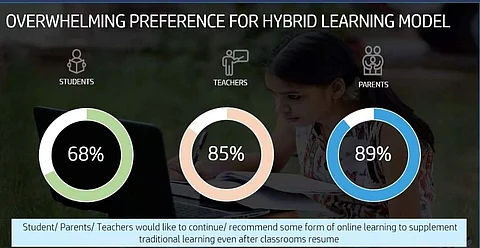

The major takeaway from the HP India Future of Learning Study 2022 was that parents, teachers and students believe that in times as unprecedented as a devastating global pandemic, online education was the crutch they relied on to ensure a continuum in education.
Among the 1,500 respondents interviewed, 98 per cent of the parents and 99 per cent of teachers agreed that learning was kept intact thanks to digital technology and education options. In fact, 92 per cent of the teachers participating in the survey conducted by HP India went one step ahead and said that online education allowed them better work-life balance while adding that better tools need to be developed in order to facilitate pedagogy. Students also said they preferred online education to regular schooling because it saves them precious travel time, providing them with opportunities to explore hobbies and develop interests. However, approximately 70 per cent of the students also said that they wished to go back to school to interact with their peers and participate in physical activities and sports. About 77 per cent of them did mention that they preferred in-person learning.
READ ALSO : HP India ushers in digital tools for e-learning in a hybrid mode at schools
The respondents hailed from 13 cities including Delhi NCR, Mumbai, Chennai, Kolkata, Bengaluru, Hyderabad, Kochi, Lucknow, Ranchi, Guwahati and Indore, and included students and teachers from both government and private schools, said Ketan Patel, MD, HP India.
Looking ahead, the survey seemed to point towards a hybrid learning model becoming the new normal even in years after the pandemic. "The pandemic will be gone, but the benefits of online learning can allow classes to continue uninterrupted in adverse situations like the recent state of pollution in Delhi, for instance, or even under disruption of law and order in the region," said Patel.
With the spotlight on the digital divide, the respondents did not seem to think that learning loss had impacted them in any way, Patel added. There are, however, concerns regarding the lack of access to devices. "In rural areas, the penetration of mobile phones is higher when compared to laptops and PCs. The survey shows us, though, that both parents (89 per cent) and students (72 per cent) prefer PCs over mobile phones for online education. HP is working on models to provide these devices in rural households as well," informed Patel.
In response to a query about digital literacy being a possible hindrance to the future projections of hybrid education, Patel said that it is a long-term process that involves various stakeholders coming together to ensure that technology brings students closer to education, rather than creating a divide. He referred to HP India's World on Wheels Bus initiative that takes around 20 PCs to rural areas, providing students with the opportunity to get in touch with online education.
"A lot of schools have already innovated themselves towards smartboard-based learning and a lot of LMS (Learning Management System) systems have been adopted, everybody has realised that with the LMS, they need to complement it with hybrid learning," said Patel.
